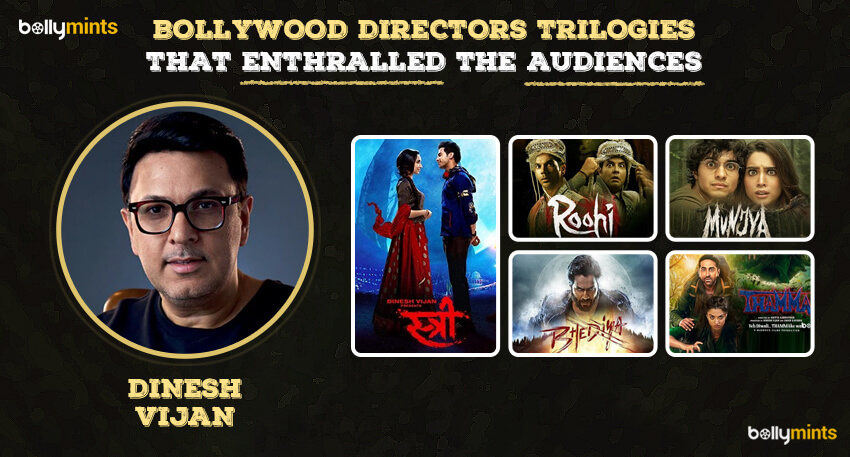Bollywood Directors Trilogies That Enthralled The Audiences
Posted On: 20 Feb 2023 | Last Updated : 22 Oct 2025 | Views : 2.7k
Bollywood movies have always managed to spring surprises to its audiences by not just entertaining them but also provide unique content. Over the years, the pattern of film making in Bollywood has changed with filmmakers trying different ways to woo audiences and make them flock to the theatres. With more and more remakes, spin-offs, sequels and biopics becoming the call of the day, filmmakers are seen moving towards a multiple-part approach with their stories that’ll ensure success at the box office. One of the Bollywood trends explored by many filmmakers is the territory of trilogies in the past where they directed three films (which were not sequels or series) one after another having either the same genre, storyline, background, cast or characters, etc., because of the first release being successful. In other words, one could define trilogies as a common thread or factor that connected them. We have come up with an engaging list of famous directors who made Bollywood trilogies that enthralled the audiences to a large extent.
1. Kishore Kumar - Chalti Ka Naam Gaadi (1958) / Badhti Ka Naam Dadhi (1974) / Chalti Ka Naam Zindagi (1982)
Common Link: Director, Genre, Cast, Title
One of the top Bollywood trilogies has got to be Kishore Kumar’s Chalti Ka Naam Gaadi (1958), Badhti Ka Naam Dadhi (1974), and Chalti Ka Naam Zindagi (1982). It all started off with Chalti Ka Naam Gaadi which was directed by Satyen Bose and turned out to become one of Bollywood’s all-time classic comedy entertainers with real-life Ganguly brothers – Ashok Kumar, Anoop Kumar, and Kishore Kumar featuring in it. Though many believed the latter two releases to be sequels that were directed by Kishore Kumar but all three had different storylines. Finally, Badhti Ka Naam Dadhi and Chalti Ka Naam Zindagi failed to generate the sort of success and magic that Chalti Ka Naam Gaadi had created at the box office.
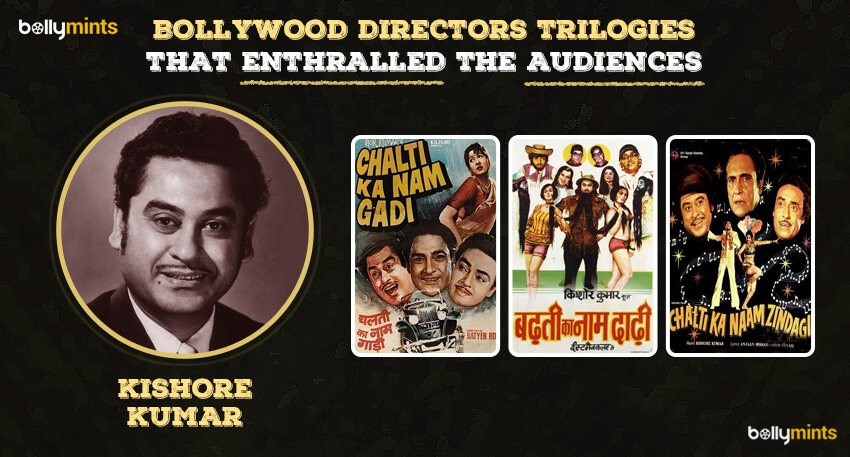
2. Raj Khosla - Woh Kaun Thi? (1964) / Mera Saaya (1966) / Anita (1967)
Common Link: Director, Genre, Cast
Another Bollywood trilogy movies that comes to mind is Raj Khosla’s evergreen suspense–thriller drama - Woh Kaun Thi? (1964), Mera Saaya (1966), and Anita (1967). Anita was the last of the suspense-thriller trilogy of the Raj Khosla - Sadhana combination which was based on the English film Vertigo. Another common factor in all these films was that Sadhana played a double role. Manoj Kumar played the male lead in Woh Kaun Thi? and Anita while Sunil Dutt played the male lead in Mera Saaya. Anita failed to meet with the same kind of success that Woh Kaun Thi? and Mera Saaya met with at the box office.
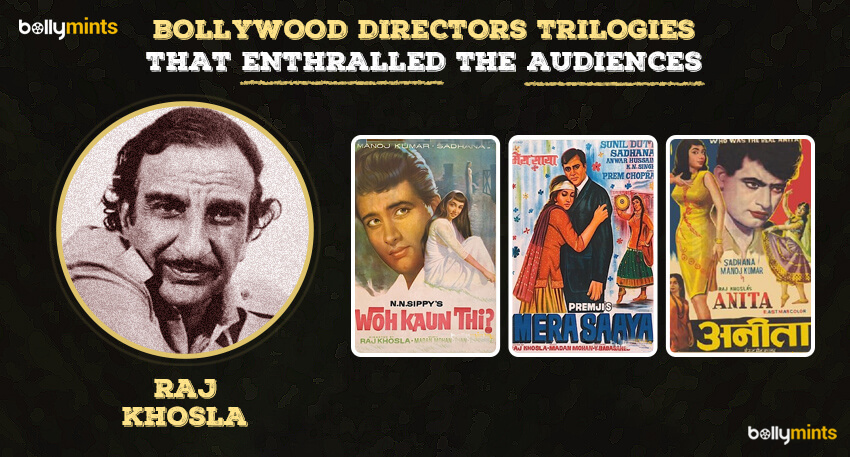
3. I. S. Johar - Johar Mehmood in Goa (1965) / Johar in Kashmir (1966) / Johar in Bombay (1967) / Johar Mehmood in Hong Kong (1971)
Common Link: Genre, Cast
Who can forget yesteryear comedian I.S. Johar’s trilogy - Johar Mehmood in Goa (1965), Johar in Kashmir (1966), Johar in Bombay (1967), and Johar Mehmood in Hong Kong (1971)? While Shantilal Soni directed Johar in Bombay (1967) and S.A. Akbar directed Johar Mehmood in Hong Kong (1971), the other two films were directed by I.S. Johar himself. The success of Johar Mehmood in Goa led to the making of the remaining three films with everyone featuring I.S. Johar himself and Mehmood in the other two. Each film had either Johar or the Johar – Mehmood combination on a mission to accomplish with a dose of comedy.
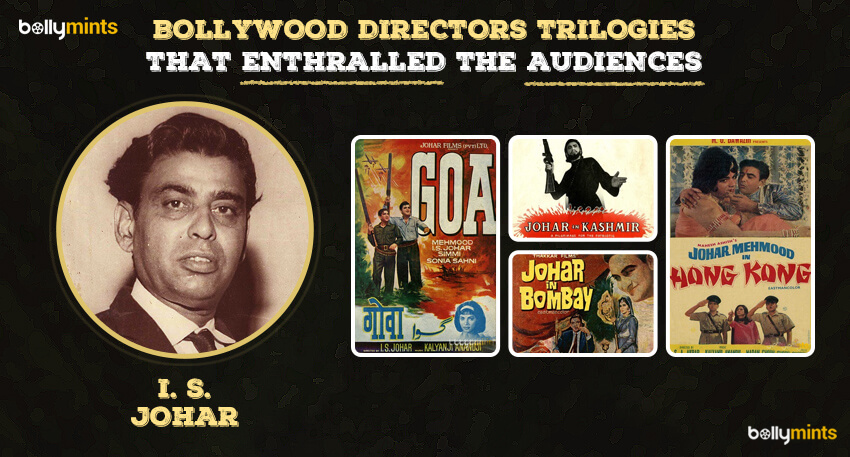
4. Hrishikesh Mukherjee - Gol Maal (1979) / Naram Garam (1981) / Rang Birangi (1983)
Common Link: Director, Genre, Cast
Director Hrishikesh Mukherjee’s evergreen comedy drama Gol Maal, Naram Garam, and Rang Birangi can be rated among the top Bollywood trilogy ever to hit the silver screen. The super combination and perfect chemistry of Hrishikesh Mukherjee, Amol Palekar, and Utpal Dutt spelled magic at the box office with all three films doing extremely well. The comic timing of Utpal Dutt and Amol Palekar in Gol Maal and Naram Garam is unforgettable and continues to be a favourite of many movie lovers to date. Though Utpal Dutt had a special appearance in Rang Birangi but still managed to raise a few laughs before the climax. Another common factor to all these films was R.D. Burman’s music which added sheen to the narration.
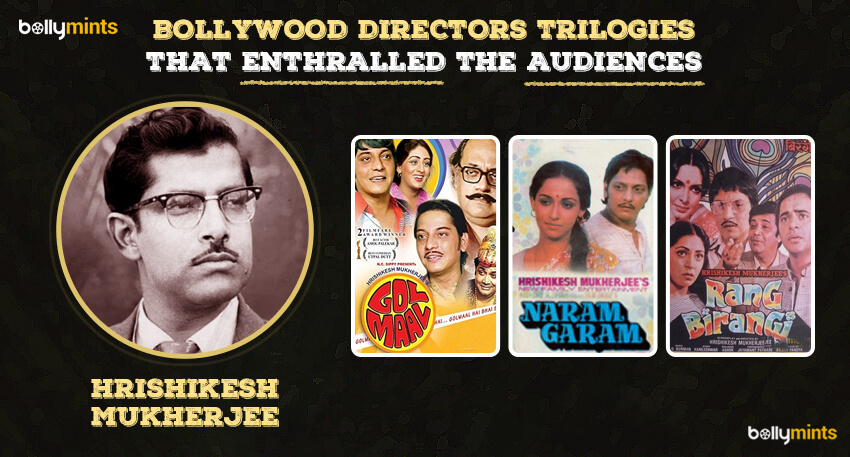
5. Ravikant Nagaich - Surakksha (1979) / Wardat (1981) / Sahhas (1981)
Common Link: Director, Genre, Cast
Who can forget director Raveekant Nagaich’s spy thriller trilogies featuring Mithun Chakraborty as Gun-Master G9 in the late 70s and early 80s? This was a time when James Bond-ish spy thrillers were in vogue and Mithun Chakraborty announced his arrival as the next big thing in Bollywood. It all started with Surakksha where Mithun played spy agent G9 for the first time while Ranjeeta played the female lead. The success of Surakksha led to the making of Wardat and Sahhas, subsequently in which Kajal Kiran and Rati Agnihotri played the female leads, respectively. And not to forget Bappi Lahiri’s music that contributed to the film’s success making G9 a household name those days.
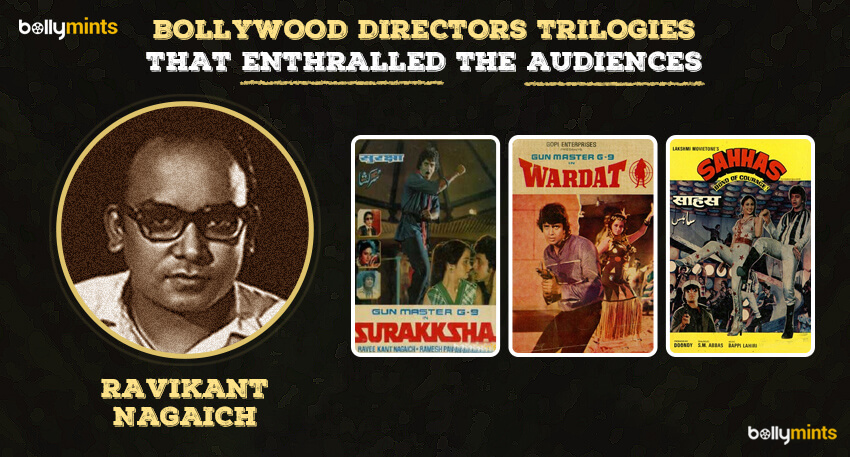
6. Saawan Kumar Tak - Souten (1983) / Souten Ki Beti (1989) / Bewaffa Se Waffa (1992)
Common Link: Director, Genre, Storyline
Producer-director Saawan Kumar Tak was somewhat obsessed with making storylines that revolved around the other woman. It all started with the Rajesh Khanna, Tina Munim, and Padmini Kolhapure starrer Souten in 1983. The super success of Souten made Saawan Kumar Tak come up with Souten Ki Beti starring Jeetendra, Rekha, and Jaya Prada, and Bewaffa Se Waffa which also had a somewhat similar storyline. Many may not know but the director had announced a film titled Souten Ki Souten after the release of Souten Ki Beti but for some reason shelved it and came up with the Vivek Mushran – Juhi Chawla – Nagma starrer Bewaffa Se Waffa which bombed badly at the box office.
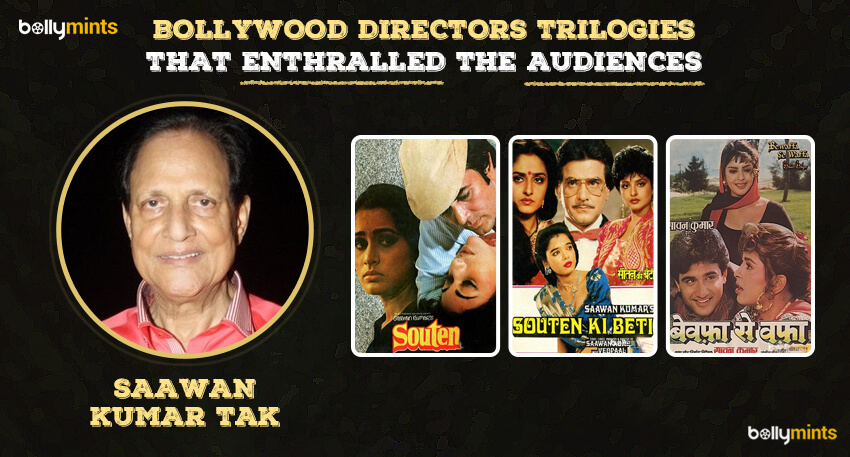
7. Govind Nihalani - Ardh Satya (1983) / Drohkaal (1994) / Dev (2004)
Common Link: Director, Genre, Cast
It was not Rohit Shetty but cinematographer-director Govind Nihalani who invented the cop universe and made the first Bollywood cop trilogy - Ardh Satya, Drohkaal, and Dev. Besides Om Puri and Amrish Puri featuring in all the films, these Govind Nihalani trilogies had the honest cop’s fight and outburst against a defunct political and judiciary system. Ardh Satya is the first of its kind and went on to become a cult classic among cop dramas making way for his Drohkaal co-starring Naseeruddin Shah and Manoj Bajpayee and Dev co-starring Amitabh Bachchan, Fardeen Khan, and Kareena Kapoor.
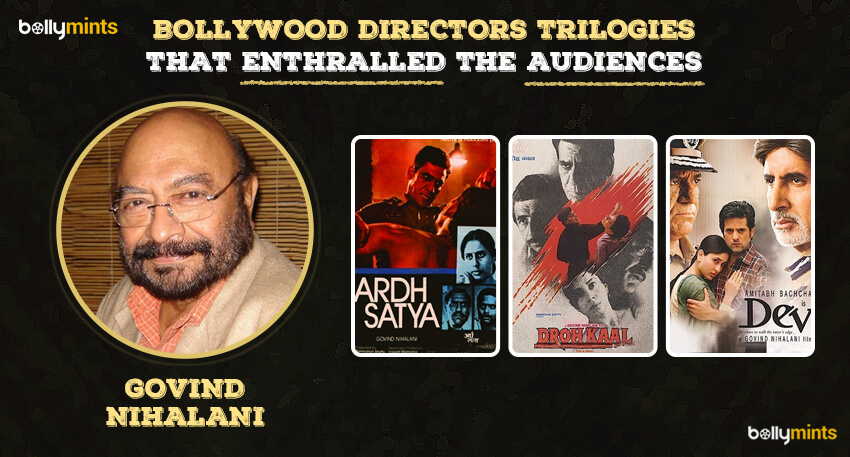
8. Shyam Benegal - Mammo (1994) / Sardari Begum (1996) / Zubeidaa (2001)
Common Link: Director, Genre, Theme
Shyam Benegal’s trilogy included Mammo, Sardari Begum, and Zubeidaa. Mammo starring Farida Jalal in the titular role was the first film of the director's Muslim trilogy, the others being Sardari Begum (1996) and Zubeidaa (2001). All three films were based on the life of the ill-fated woman who did not get her due to the circumstances they were given to face. Kirron Kher as Sardari Begum and Karisma Kapoor as Zubeidaa received critical acclaim for their performances while this trilogy is regarded amongst Benegal's best works to date.
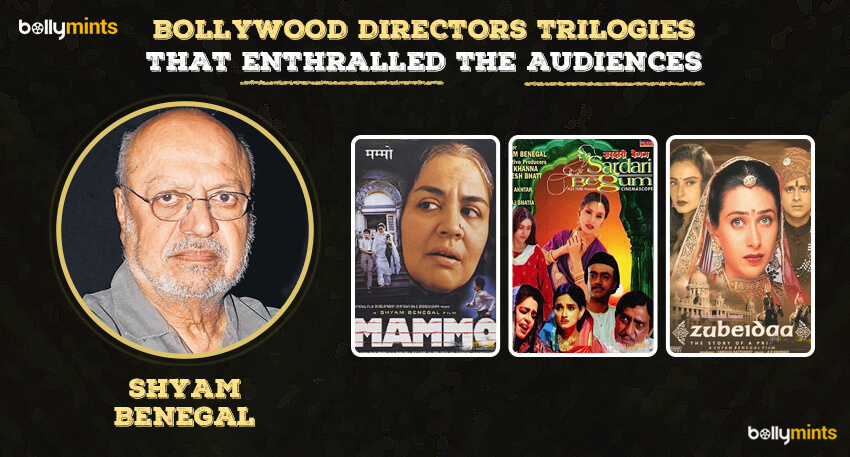
9. David Dhawan - Coolie No.1 (1995) / Hero No.1 (1997) / Jodi No.1 (2001)
Common Link: Director, Genre, Cast
Talk about Bollywood trilogy movies and how can one miss out on the king of entertainment of the 90s, David Dhawan and Govinda. The combination of David Dhawan and Govinda was nothing short of magic and gave us more than 17 films together starting from Taaqatwar in 1989. David Dhawan not just enjoyed working with Govinda but also was obsessed with the ‘No.1’ word in his movie titles. His trilogy featured - Coolie No.1, Hero No.1, and Jodi No.1 with Govinda in the lead and Sanjay Dutt co-starring in the last. Barring a couple of duds at the box office the David Dhawan and Govinda combination always enjoyed a high success rate.
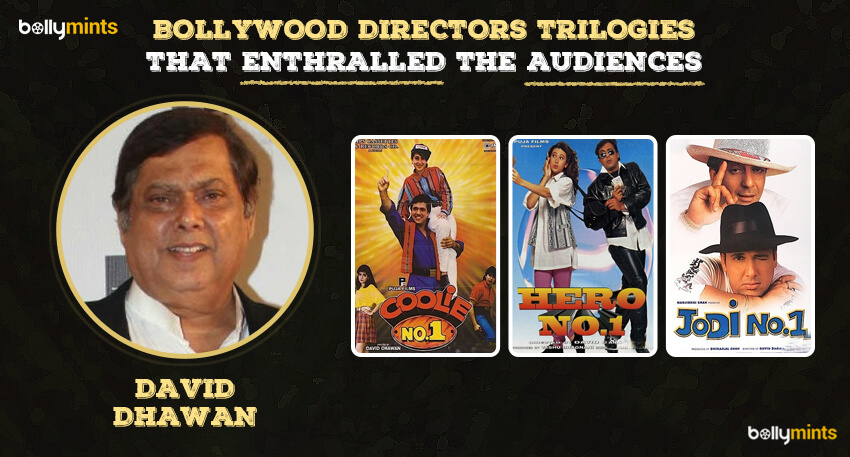
10. J. P. Dutta - Border (1997) / LOC: Kargil (2003) / Paltan (2018)
Common Link: Director, Banner, Genre
Director J.P. Dutta was initially known for making movies on the caste system prevailing in Rajasthan but his war drama trilogy including Border, LOC: Kargil, and Paltan turned the tide in his favour. Border based on the 1971 Longewala battle remains J.P. Dutta’s claim to fame and biggest hit to date that was followed by LOC: Kargil which is one of the longest Bollywood movies in terms of runtime and was based on the Pakistan intrusion in 1999 and Paltan based on the Chinese intrusion in 1967 at Nathu La and Cho La, Sikkim border after the 1962 Sino-Indian War.
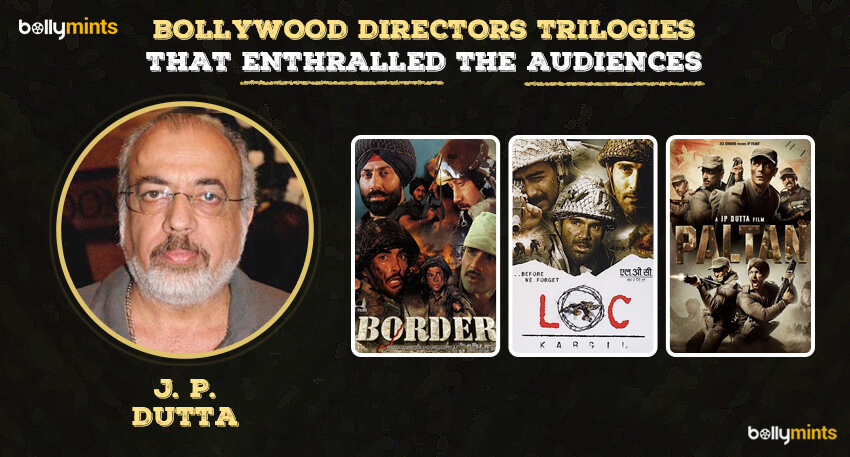
11. Ram Gopal Varma - Satya (1998) / Company (2002) / D (2005)
Common Link: Director, Genre, Theme
Director Ram Gopal Varma is known for making films either in the underworld or horror genre. The once maverick Bollywood director amazed everyone by making the hard-hitting Satya that showcased the dark side of the underworld while Company was loosely based on the story of underworld kingpins Dawood Ibrahim and Chhota Rajan who split after a close association. The third film that formed the Ram Gopal Varma trilogy was the Randeep Hooda starrer D which was only produced by him but directed by newcomer Vishram Sawant. Satya and Company went on to become runaway hits while D met with a lukewarm response at the ticket counters.
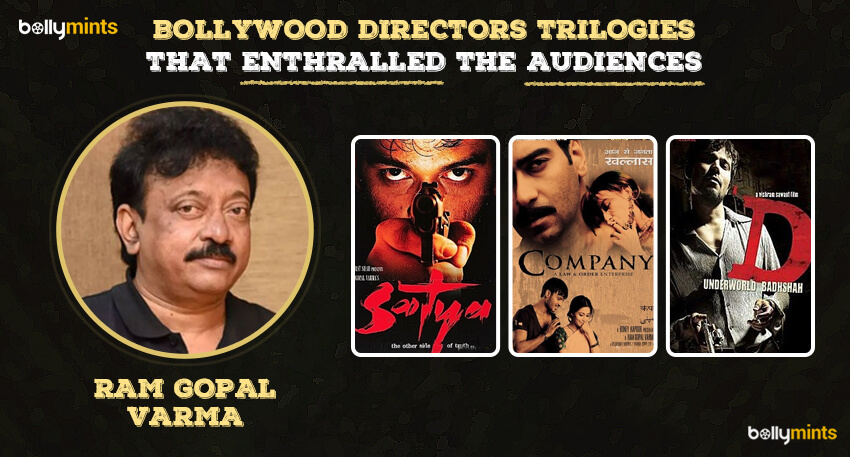
12. Vishal Bhardwaj - Maqbool (2003) / Omkara (2006) / Haider (2014)
Common Link: Director, Genre, Theme
Think of Bollywood trilogies and what comes to mind is Vishal Bhardwaj’s trilogy of Shakespeare adaptations, which began with Maqbool (2003), and Omkara (2006) and completed with Haider (2014). Maqbool was based on a modern-day adaptation of William Shakespeare’s 'Macbeth' while Omkara was based on 'Othello' and Haider on 'Hamlet'. Love, deceit, betrayal, and revenge were common to these themes which made them a worthwhile watch. Maqbool brought out the best in Irrfan Khan and Pankaj Kapur while Omkara and Haider brought out the best in Ajay Devgn, Saif Ali Khan, and Shahid Kapoor, respectively. Vishal Bhardwaj not just helmed all three films but also provided music for them.
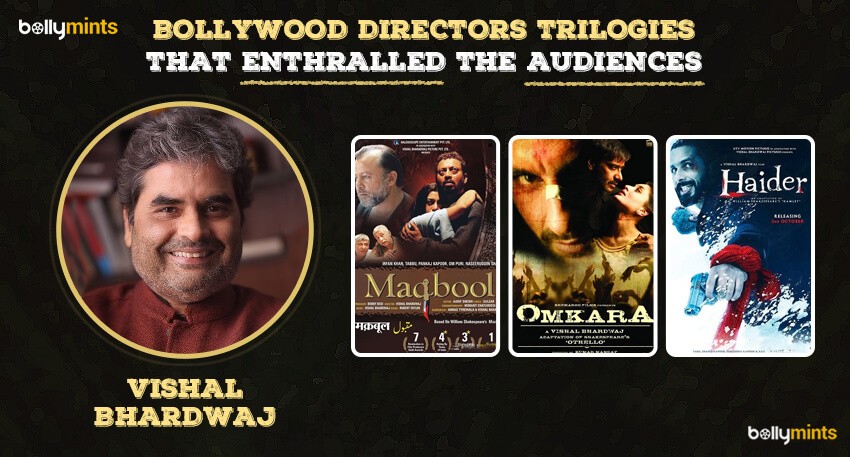
13. Madhur Bhandarkar – Page 3 (2005) / Corporate (2006) / Traffic Signal (2006) / Fashion (2008)
Common Link: Director, Genre, Theme
Madhur Bhandarkar also qualifies on the list of Bollywood trilogy directors. His Page 3, Corporate and Traffic Signal were already a part of the trilogy of films that reflected the dark side and present social structure of Mumbai city. Besides being made by the same director the trilogy dealt with a dark theme that showcased what goes behind the scenes involving scams, parties, drugs, politics, homosexuality, business deals, casting couches, etc. His Priyanka Chopra starrer Fashion served as an added bonus to his trilogies which yet again took us into the good and bad world of fashion and glamour and how young girl models are exploited.
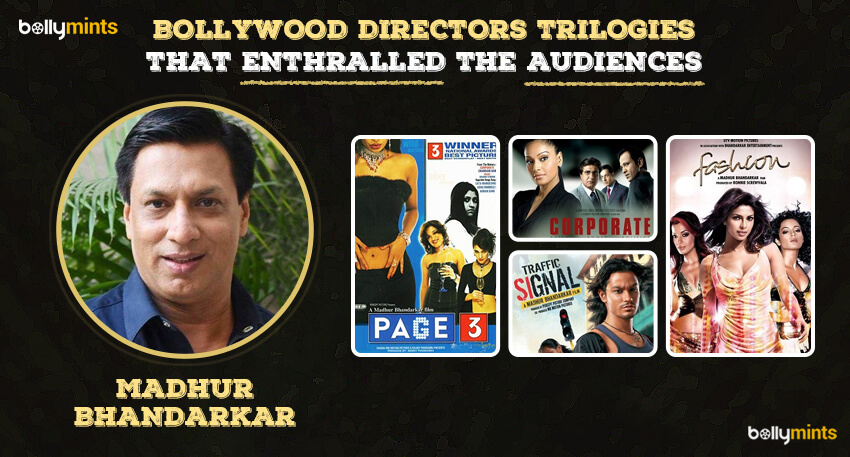
14. Rohit Shetty - Singham (2011) / Simmba (2018) / Sooryavanshi (2021)
Common Link: Director, Genre, Theme
Rohit Shetty is often slotted for making Bollywood series movies but truth is that he also has a trilogy legacy going for him. Like Govind Nihalani, Rohit Shetty’s cop universe comprises of Singham, Simmba, and Sooryavanshi where Ajay Devgn, Ranveer Singh, and Akshay Kumar played the titular roles, respectively. Rohit Shetty’s cop trilogy has all been successful and appealed to the classes as well as the masses. The success of his cop action dramas has helped him to work on their sequels too which expectedly include car chases, lavish colourful sets, powerful hard-hitting dialogues, and high-octane action sequences, etc.
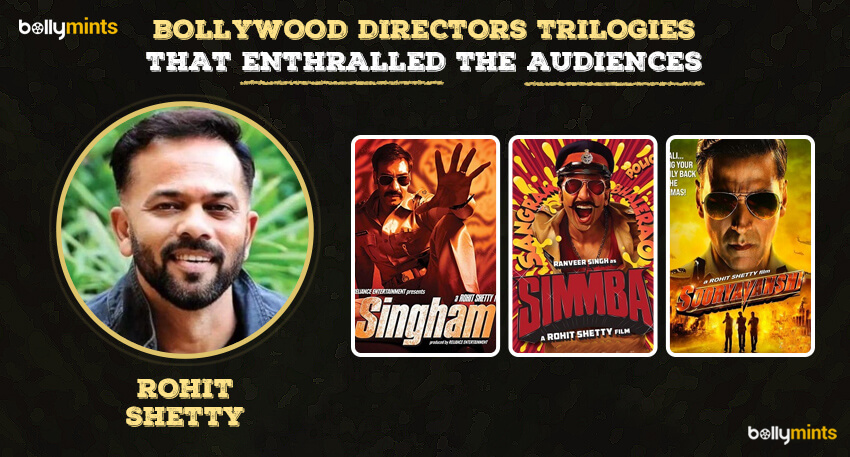
15. Omung Kumar - Mary Kom (2014) / Sarbjit (2016) / PM Narendra Modi (2019)
Common Link: Director, Genre, Theme
Many may not have realized but director Omung Kumar who is known for his Bollywood biopics also makes it to the list of directors with Bollywood trilogies. Omung Kumar started his career as an art director/production designer but soon made his directorial debut with the Priyanka Chopra starrer Mary Kom in 2014 and followed it up with the Randeep Hooda and Aishwarya Rai starrer Sarbjit in 2016 and completed his trilogy with the Vivek Oberoi starrer PM Narendra Modi in 2019. The common theme connecting all three films was the biopic genre.
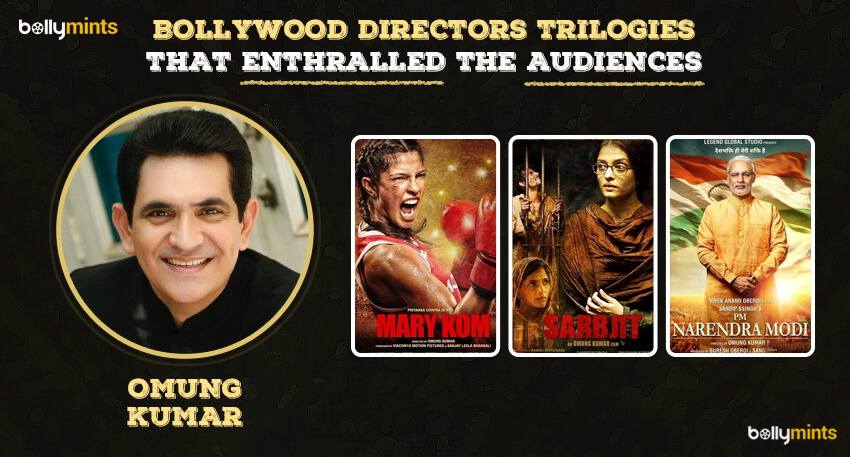
16. Hansal Mehta - Shahid (2012) / Omerta (2017) / Faraaz (2023)
Common Link: Director, Genre, Theme
Director Hansal Mehta who is known for making realistic and dark films based on true events and incidents is also a part of the Bollywood trilogy club. His trilogy comprised of the controversial Shahid (2012), a biopic based on the life of lawyer and human rights activist Shahid Azmi, that was followed by Omerta (2017) which was based on the life of Ahmed Omar Saeed Sheikh, a British terrorist of Pakistani descent who plotted the murder of Wall Street Journal journalist Daniel Pearl in 2002. And finally, Faraaz (2023) was based on the terrorist attack on the Holey Artisan Bakery in July 2016 in Dhaka that shook Bangladesh.
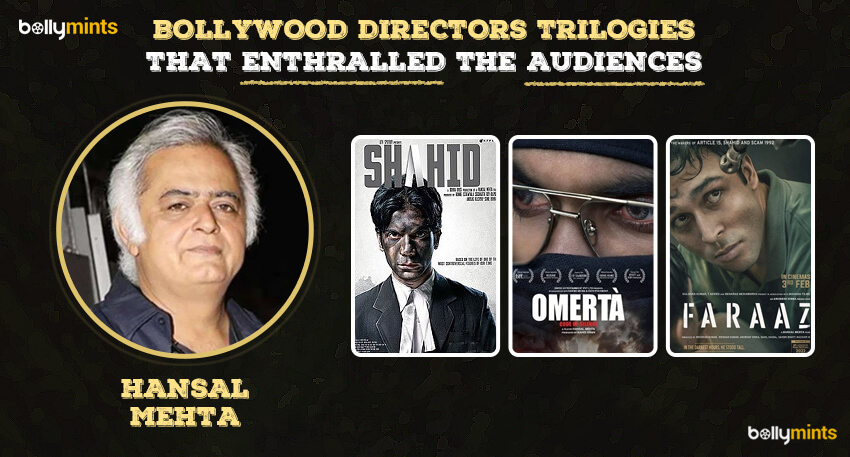
17. Aditya Chopra - Tiger (2012) / War (2019) / Pathaan (2023)
Common Link: Producer, Genre, Theme
Yash Raj Films Spy Universe headed by Aditya Chopra is not the last but the least as far as Hindi movie trilogies are concerned. Though Aditya Chopra was the producer of all the films made under the YRF banner, namely – Ek Tha Tiger, Tiger Zinda Hai, Tiger 3, War, and Pathaan but all were directed by different directors. Each spy thriller is a franchise brand by itself with sequels to their credit. What makes these spy thrillers unique is that each release went on to become a blockbuster minting money at the box office.
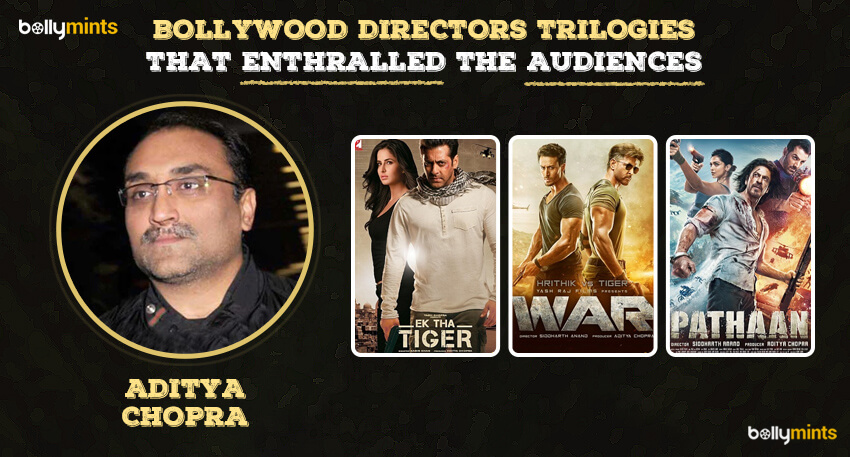
18. Deepa Mehta – Fire (1998) / 1947: Earth (1999) / Water (2005)
Common Link: Director, Genre
Indian-born Canadian filmmaker Deepa Mehta is best known for her elements trilogy that included – Fire (1998), 1947: Earth (1999) and Water (2005). All three films of hers were based on a social stigma that won her critical acclaim. Fire though was banned from playing in theatres which touched upon the sensitive subject of lesbian romance while 1947: Earth was more political and dealt with India’s partition. Water too had its share of controversies before it was reshot with a different cast and released in selected festivals and on streaming platforms.
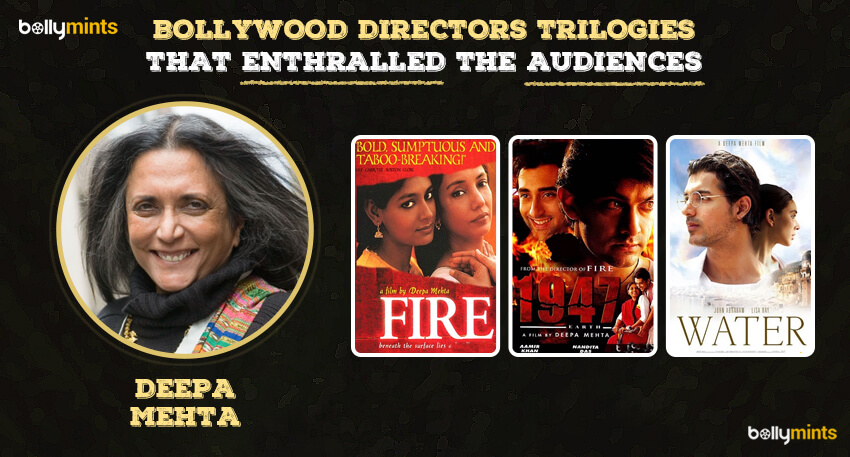
19. Basu Bhattacharya - Anubhav (1971) / Aavishkar (1974) / Griha Pravesh (1979)
Common Link: Director, Genre, Theme
Director Basu Bhattacharya’s trilogy comprised of Anubhav, Aavishkar and Griha Pravesh which was made around marital discord. Though his follow up film Aastha: In the Prison of Spring (1997) starring Om Puri and Rekha also could be added to his 70s trilogy of movies which yet again was set on the institution of marriage, exploring the growing materialism in modern urban marriage and its moral values.
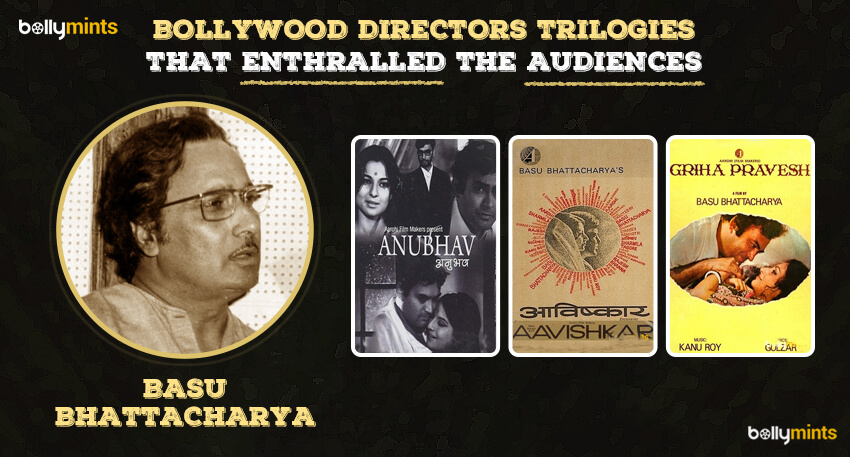
20. Vivek Agnihotri – The Tashkent Files (2019) / The Kashmir Files (2022) / The Bengal Files (2025)
Common Link: Director, Genre, Cast, Title
Director Vivek Agnihotri completes his Bollywood trilogies with the third and final instalment of The Bengal Files: Right to Life. His earlier two films were The Tashkent Files: Right to Truth, which dealt with the mysterious death of India’s late Prime Minister Lal Bahadur Shastri during his visit to Tashkent, while The Kashmir Files: Right to Justice revolved around the genocide of Kashmiri Pandits in 1990. Vivek Agnihotri’s trilogy was based on modern India’s history of Hindu genocide, while The Bengal Files: Right to Live is based on the 1946 Great Calcutta killings. Besides his trilogy having the same genre and somewhat similar titles, it also had some common cast involving Pallavi Joshi, Mithun Chakraborty, Anupam Kher, and Darshan Kumar, etc.
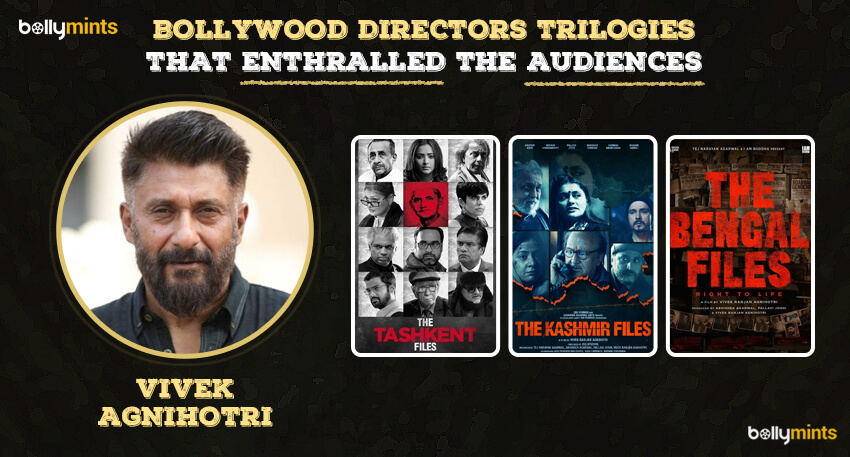
21. Dinesh Vijan - Stree (2018) / Roohi (2021) / Bhediya (2022) / Munjya (2024) / Thamma (2025)
Common Link: Director, Banner, Genre, Theme
Producer Dinesh Vijan also joins the list of Bollywood trilogy movie makers, or should we say quadrologies, who have created Maddock Films' horror romantic comedy universe like the Ramsay brothers did in the 70s, 80s, and 90s. Dinesh Vijan hasn’t directed any of these horror romantic comedies but has largely created a successful universe. It all started with the success of Stree in 2018 which was directed by Amar Kaushik and the sequel to it, Stree 2 (2024) that went on to become a blockbuster. His other horror comedy universe included Roohi (2021), directed by Hardik Mehta, Bhediya (2022), directed by Amar Kaushik, Munjya (2024) and Thamma (2025), directed by Aditya Sarpotdar.
